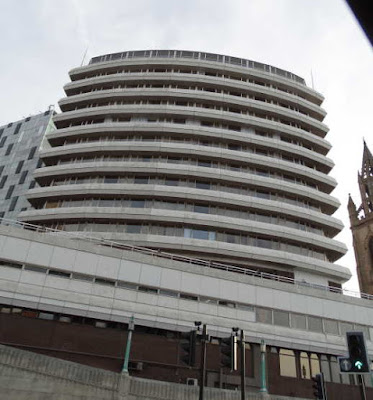Over the last few decades the number of tall buildings in the centre if Liverpool has grow'd like Topsy. With the usual local humour they are not referred to as skyscrapers but Scousescrapers.
When I was young the waterfront skyline had just three main buildings . Then during the 1960s other tall buildings began to be constructed.
Now it looks like this:-
Here are some of Liverpool's more recent Scousescrapers.
Scouse is a type of lamb or beef stew. The word comes from lobscouse, a stew commonly eaten by sailors throughout Northern Europe, which became popular in seaports such as Liverpool. In addition to the dish it is now used as a term for people originating in Liverpool or their accent/dialect.
Having been born in Liverpool, I am a Scouser though Dad and Mum ensured I never adopted a Scouse accent.
The first known use of the term "lobscouse" is dated 1706, according to Webster's dictionary. Smollet refers to "lob's course" in 1750.
The roots of the word are unknown, but there are at least three competing theories. It has been suggested that the dish is "almost certainly" of Baltic origin, and labs kauss in Latvian and labas kaušas in Lithuanian both mean "good ladleful". Similar dishes are traditional in countries around the North Sea, such as Norway (lapskaus), Sweden (lapskojs) and Denmark (skibberlabskovs, meaning "skipper's lobscouse"). Another theory posits a Low German origin from lappen (dewlap) and kaus (bowl). An English origin has also been proposed: through "lout’s course", via "lob’s course" to "lobscouse".
Some of Liverpool's tall buildings date back to the turn of the 20th century or earlier like the Liver Buildings (below after having been cleaned in the early 1960s).
The dock buildings may not be skyscrapers but they are still pretty tall (the dock warehouses on the right have been converted into a hotel).
There are also a lot of new medium-rise buildings which although not noticeably tall make brilliant use of glass and other material.
And even where that isn't the case the buildings have often been enhanced one way or another.

















.jpg)


















































Sometimes the changes creep in so slowly it takes looking back at a picture from long ago to see how different things are now. Your blog always teaches me something, or piques my curiousity about something!
ReplyDeleteI guess what we think of as new is all relative. I can't remember the building in the third to last photo not being there. I wonder how long ago it was built.
ReplyDeleteOddly it's not that long ago that I was looking for a photo of the Liverpool Pier Hear three buildings and was astonished at just how much the landscape when looking at the waterfront has changed. Thanks for that CJ.
ReplyDeleteI'm glad you explained Scouse but the leap from stew to tall buildings confuses me!
ReplyDeleteIt was simply the fact that in Liverpool they are called Scousescrapers not skyscrapers. Saying that without explaining Scouse would have been confusing for folk from other parts.
DeleteI've often wondered where the term came from. Probably first heard it when someone was describing the Beatles' accent
ReplyDeleteIt's Labskaus in German, but I have never eaten it, no matter how many times I've been to the North to see my relatives there.
ReplyDeleteI have mixed feelings when it comes to high rises. Of course we need them; there are far too many of us on the planet anyway, so building up instead of spreading out (which naturally still happens at the same time) seems to be a good idea.
But spending one's working day - or most of one's life - in the shadow of such high buildings does not in the least appeal to me.
I never knew what the meaning of "Scouse" was - thanks for explaining it. I sometimes marvel at the changes in London's skyline, too.
ReplyDelete